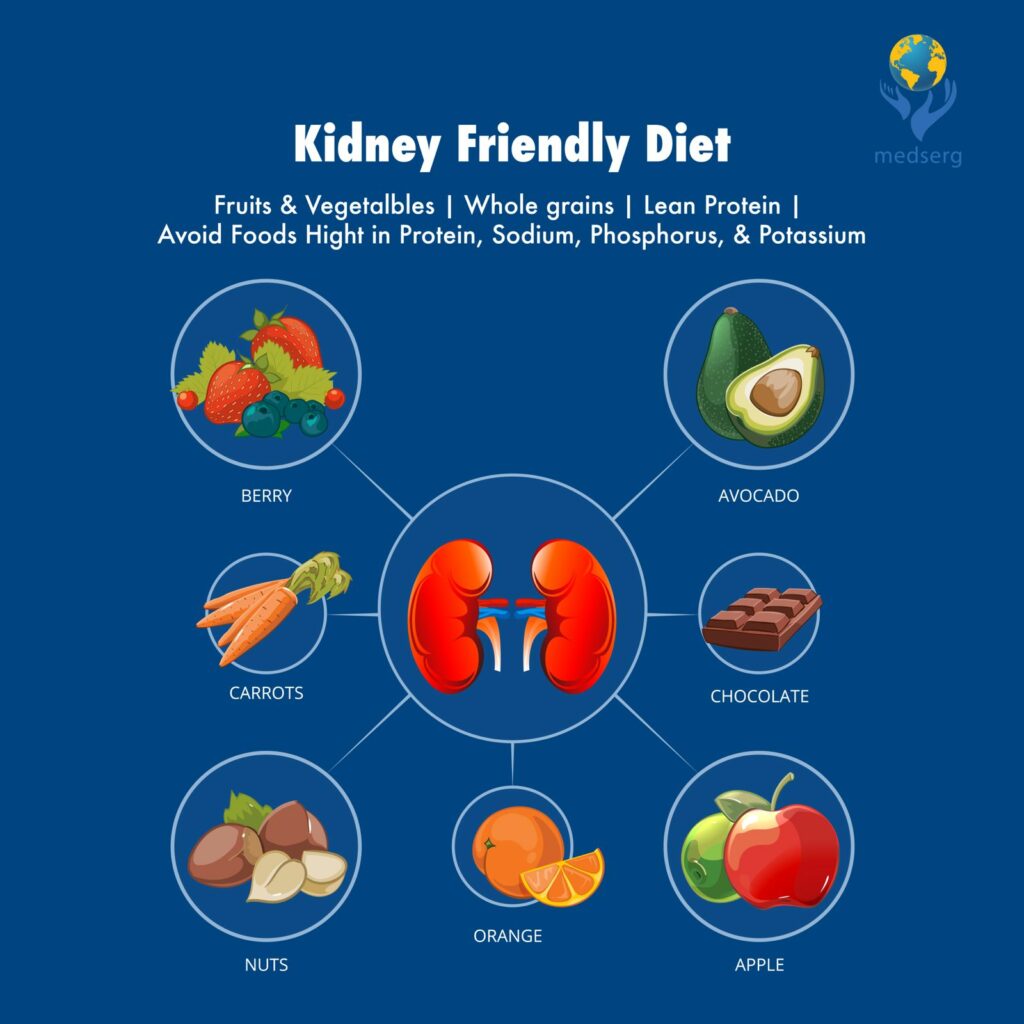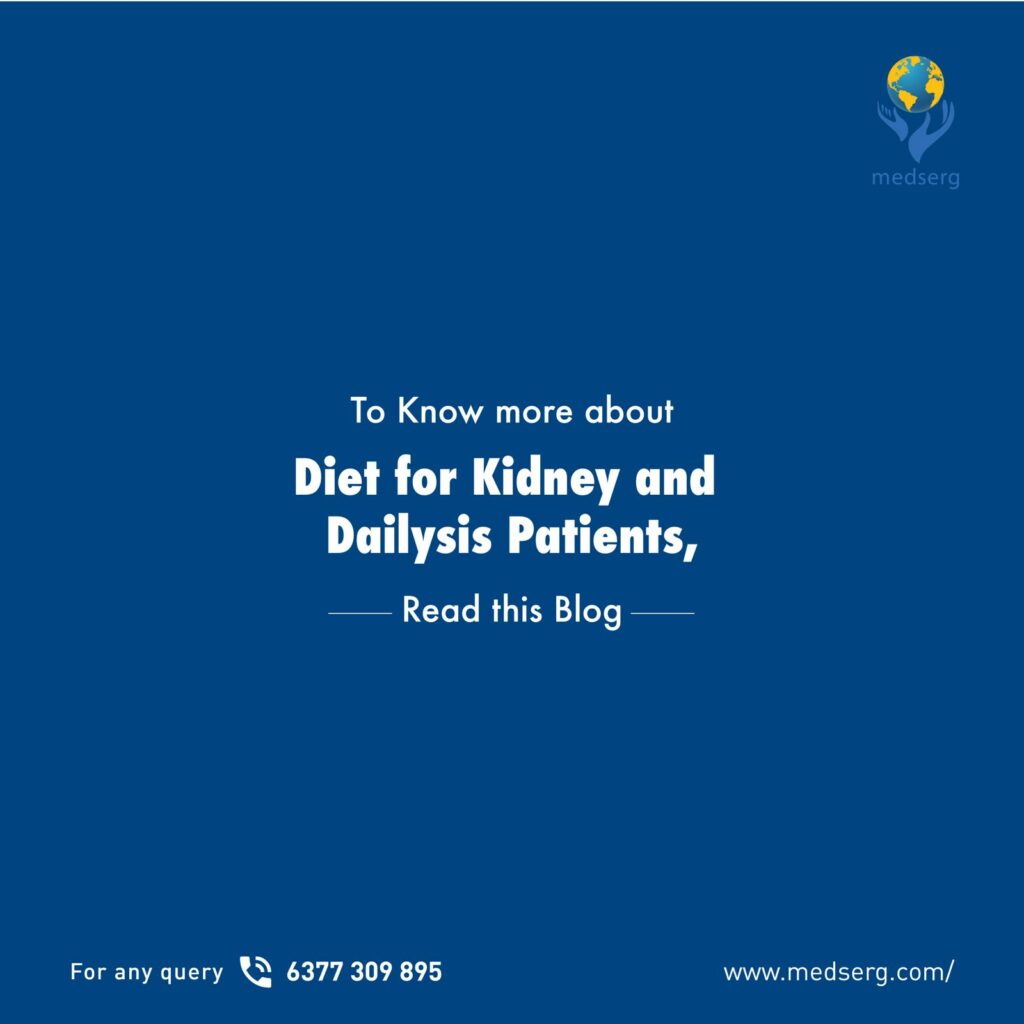The kidneys are small but powerful organs of the body that perform many vital functions like filtering waste products, balancing fluids in the body, releasing essential hormones that regulate the blood pressure, and producing urine. There are various ways in which these pairs of vital organs can be damaged. Kidney diseases are a common problem affecting almost 10% of the entire world’s population. Therefore, it’s necessary for people with any such disease to follow a special kidney friendly diet to maintain the kidney health, especially if they are undergoing dialysis.
What is Dialysis?
As mentioned earlier, when the kidneys can’t perform the necessary functions due to the kidney failure, dialysis treatment is what that comes to the rescue. It helps to keep the body function as normally as possible by removing the accumulated water, salts and other waste products in the blood. If left untreated, these wastes will poison the body, gradually damaging other organs.
So, people with renal failure are treated with dialysis of kidney. Dialysis definition involves the process of removal of waste products from the blood. Since the Kidney’s ability to filter the blood is compromised, consequently, the patient undergoing kidney dialysis must have a balanced diet, which includes a specific amount of protein, energy, minerals, vitamins, and fluids for daily intake. So the dialysis patients should concern a dietitian who can create them a healthy kidney disease diet plan.
However, please note that dialysis isn’t a cure for any of the kidney disease or other problems affecting the kidneys. They are just an alternate procedure to maintain the metabolism of the body. A different treatment like kidney transplant or kidney removal may be needed to address those concerns.

What are the Different Dialysis Types?
There are three different types of kidney dialysis. These are-
Hemodialysis
It is the most common type of dialysis. The process involves removing the blood from the body that passes through a dialysis machine called, hemodialyzer, commonly known as an artificial kidney. The artificial kidney eliminates the waste and extra fluid from the blood and the filtered blood is then returned to the body. The entire process is performed under the guidance of expert dialysis technician at a hospital, or dialysis center. To get the blood to flow to and from the artificial kidney, your kidney specialist in India will perform surgery to create an entry point into your blood vessels, commonly known as dialysis fistula. This treatment usually lasts three to five hours and are performed two to three times per week. After a patient has been on hemodialysis for an extended period, the doctor may feel that the patient is ready to perform dialysis at home in case they need long-term treatment.
Peritoneal Dialysis
The process of Peritoneal dialysis involves implanting a peritoneal dialysis catheter into the abdomen surgically. During dialysis treatment, dialysate, a special fluid flows into the body, to absorb waste from the bloodstream. The dialysate is then drained from the abdomen. This entire procedure takes a two to three hours and needs to be repeated four to six times per day.
Continuous Renal Replacement Therapy (CRRT)
This therapy is used primarily in the intensive care unit (ICU) for patients suffering from acute kidney failure. In this process, a machine passes the blood through dialysis tubing where a filter removes the excess water and waste products from it. The blood is returned to the body, along with a replacement fluid. This procedure is performed 12 to 24 hours a day, generally every day.
Various kidney function tests like kidney ultrasound are performed at regular intervals to monitor the condition of the patient.
Balanced Dialysis Diet for Patients
Fluids
Consumption of fluids by dialysis patient should be monitored very carefully for a proper kidney diet. A large amount of fluids in the body can cause weight gain or swelling. If an excessive amount of liquid gets accumulated in the lungs, then the patient will face problems in breathing and may lead to other heart problems and fluctuations in the blood pressure.
Though the extra fluids are removed during dialysis kidney, only a specific amount can be removed safely at a time. In case the amount of fluids is too much, the dialysis can make the patient feel sick or dizzy and sudden drop in blood pressure will also be one of the repercussions.
While monitoring the liquid intake of a patient, it should be kept in mind that the matter which is liquid at room temperature doesn’t only count as a liquid, but also there are some vegetables and fruits which have fluid in them like lemon and oranges and food items which includes liquid in their recipe, will also add in liquid consumption.
Protein
One of the dialysis side effects is that a certain amount of protein gets lost during the process. So, a high intake of protein is necessary to make up for the loss. The scarcity of protein in the body might lead to weight loss and also diminishes the ability of the body to fight against germs and infections.
Some of the high-quality protein products are poultry items, fish, meat and egg white.
Sodium salt
Low salt consumption is always a healthy choice for a dialysis patient as intake of salt can make a person thirsty and will eventually lead to excessive liquid consumption.
To restrict the sodium intake, one should always use whole spices and fresh herbs while cooking and avoid canned food, bottled extract of chicken and also the processed food which contains a large amount of sodium, i.e. more than 250 grams in each serving.
A minimal amount of salt should be used while cooking or none at all. And to give a flavor to the food, lime and vinegar are the better options.
Phosphorus
Excessive consumption of food items containing phosphorus like lentils, Cocoa drinks, Cola drinks, beer, beans and nuts, can be quite harmful to the body of a dialysis patient. As dialysis does not remove the phosphorus from the body which eventually gets accumulated in the blood, due to which the bones start releasing calcium as a result of which the bones become weak and fragile. Hence, this massive amount of phosphorus in the blood makes calcium-Phosphorus crystals in the heart, joints, blood and muscles which cause constant pain, problems in blood circulation, irritation in the eye.
The patients should consume phosphate binders to control the phosphate level in the blood by restricting the absorption of phosphorus from the food consumed. The kidney specialist prescribes the phosphate binders medications, according to the patient health conditions.
Potassium
People who are treated with dialysis should not eat the food items which contain high Potassium content like tomatoes, potatoes, bananas and pork. As kidney failure causes impaired function between the kidneys, which in turn raises the level of potassium in the blood.
High level of potassium in the blood can weaken the muscles and cause abnormal heartbeat, which can also lead to heart failure in extreme cases.
Supplements
It is likely that sometimes the diet does not provide the patient with enough minerals and vitamins. Thus they can acquire the necessary amount of minerals and vitamins through nutritional supplements, but only under the prescription of the respective healthcare specialist.
If you are wondering where to find the best dialysis center near me, visit Medserg Health. Medserg provides the best dialysis facility in India. For the best care and treatment for your kidney diseases, book an appointment with our doctors for kidney diseases now.







